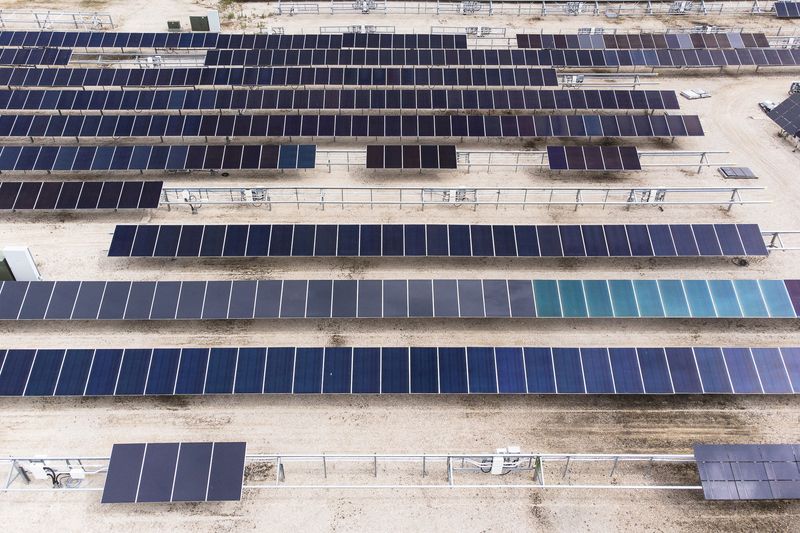By Nichola Groom
(Reuters) -The U.S. Commerce Department on Tuesday announced anti-subsidy countervailing duties on solar cells imported by companies in Vietnam, Cambodia, Malaysia and Thailand that were lower than some expected for several major Chinese producers.
The announcement is the first of two preliminary decisions expected by the Commerce Department this year in a trade case brought by South Korea's Hanwha Qcells, Arizona-based First Solar (NASDAQ:FSLR) and several smaller companies seeking to protect billions of dollars in investments in U.S. solar manufacturing.
The group, called the American Alliance for Solar Manufacturing Trade Committee, accused Chinese companies with factories in the four Southeast Asian countries of flooding the U.S. market with panels priced below their cost of production and of receiving unfair subsidies that make American products uncompetitive.
Others in the solar industry say those low-priced imports are critical for both clean-energy project developers competing with fossil fuels and for domestic solar factories that use overseas-made cells in panels assembled on U.S. soil.
According to a fact sheet posted on the Commerce Department's website, the agency calculated general subsidy rates of 9.13% for imports from Malaysia, 8.25% for imports from Cambodia, 23.06% for imports from Thailand and 2.85% for imports from Vietnam.
Overall, the rates were lower than expected, according to Roth Capital Partners solar industry analyst Philip Shen, who said in a client note that he had been expecting duties of around 15%.
Large manufacturers have their own separate duty rates, and several big China-based producers received far lower rates than Hanwha Qcells, a global producer that brought the trade case to protect its large investment in U.S. solar factories in Georgia.
The Commerce Department calculated a subsidy rate of 14.72% for Hanwha Qcells products produced in Malaysia, based in part on government loans and below-market land provisions to the company in that country.
In comparison, a large Chinese-owned rival operating in Malaysia, Jinko Solar, received a subsidy rate of 3.47%.
China's Trina Solar received a duty rate of just 0.14% for products it makes in Thailand. In Vietnam, Chinese companies Boviet Solar and JA Solar received rates of 0.81% and 2.85%, respectively.
Hanwha Qcells would not comment on the department's finding.
Representatives for Jinko, Trina, Boviet and JA Solar were not immediately available for comment. All four companies either have or are in the process of setting up U.S. factories.
Some of the duties for companies in Vietnam and Thailand will apply retroactively for 90 days because the Commerce Department found some companies increased shipments to the United States to get ahead of potential duties. The retroactive duties do not apply to shipments by Trina, Boviet or JA Solar, according to an agency document.
An attorney for the American Alliance for Solar Manufacturing Trade Committee, which includes Hanwha Qcells, said the department's findings were in line with expectations and that the final decision could yield different duties.
"Some of the margins definitely do not yet reflect the full extent of government subsidies that are occurring in the industry," Tim Brightbill, an attorney with Wiley Rein in Washington, said on a call with reporters.

A final order will be issued next April.
The Solar Energy Industries Association, a large U.S. trade group, said tariffs will not solve the industry's challenging market conditions.